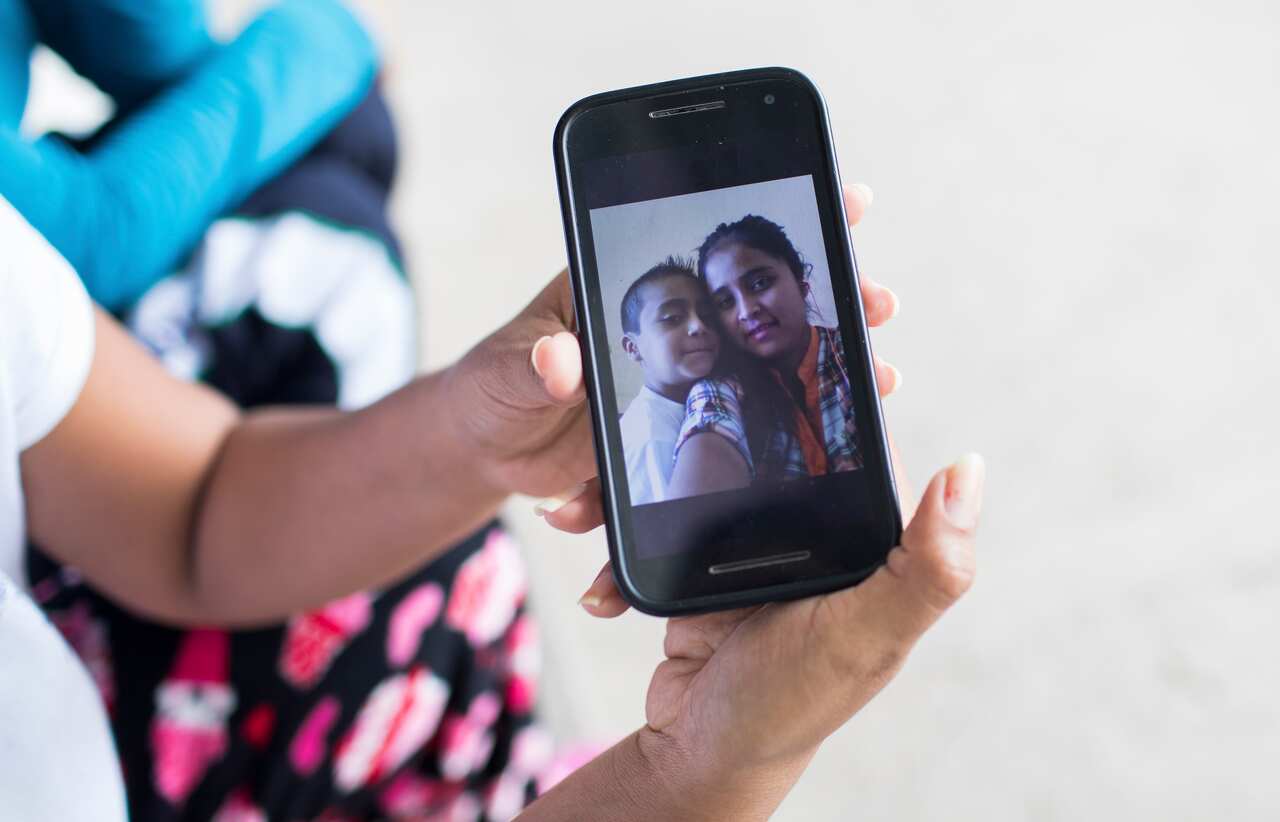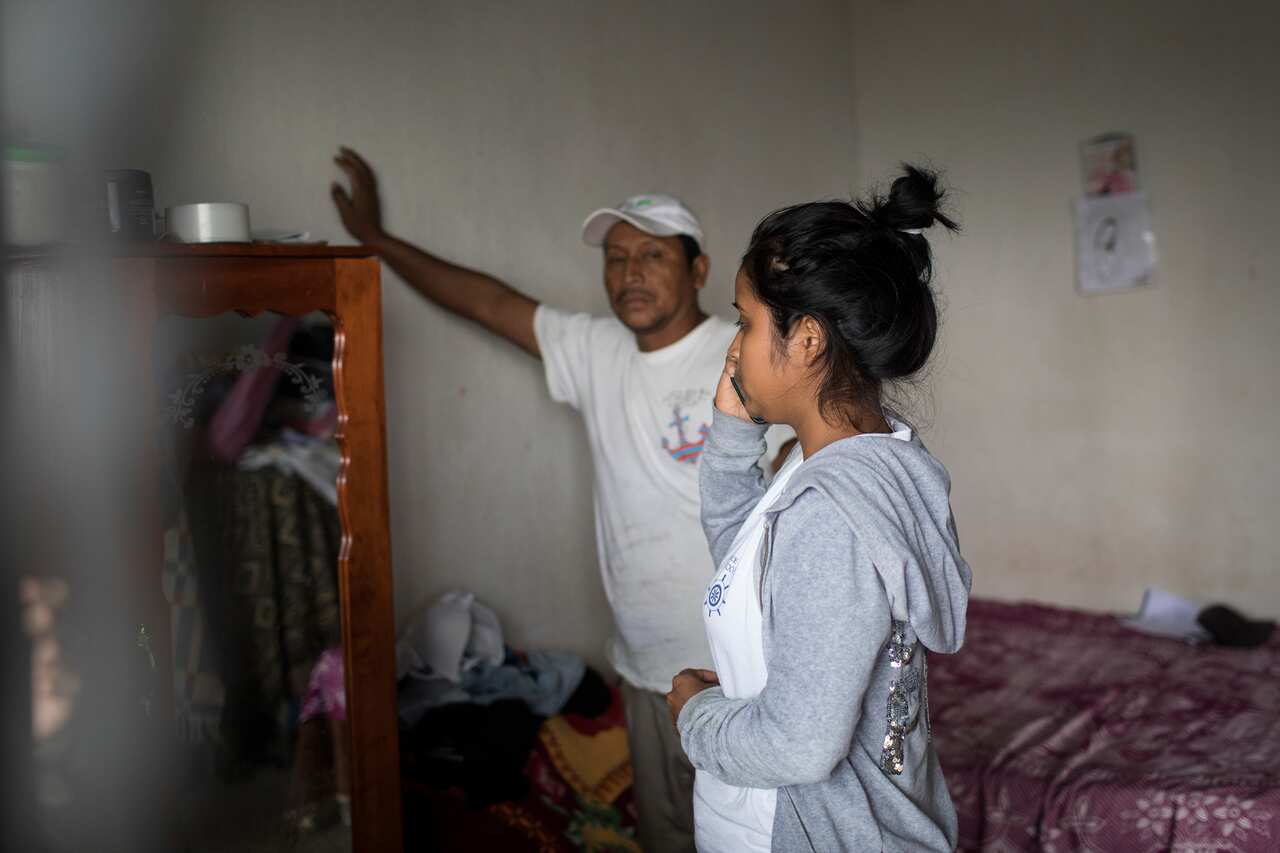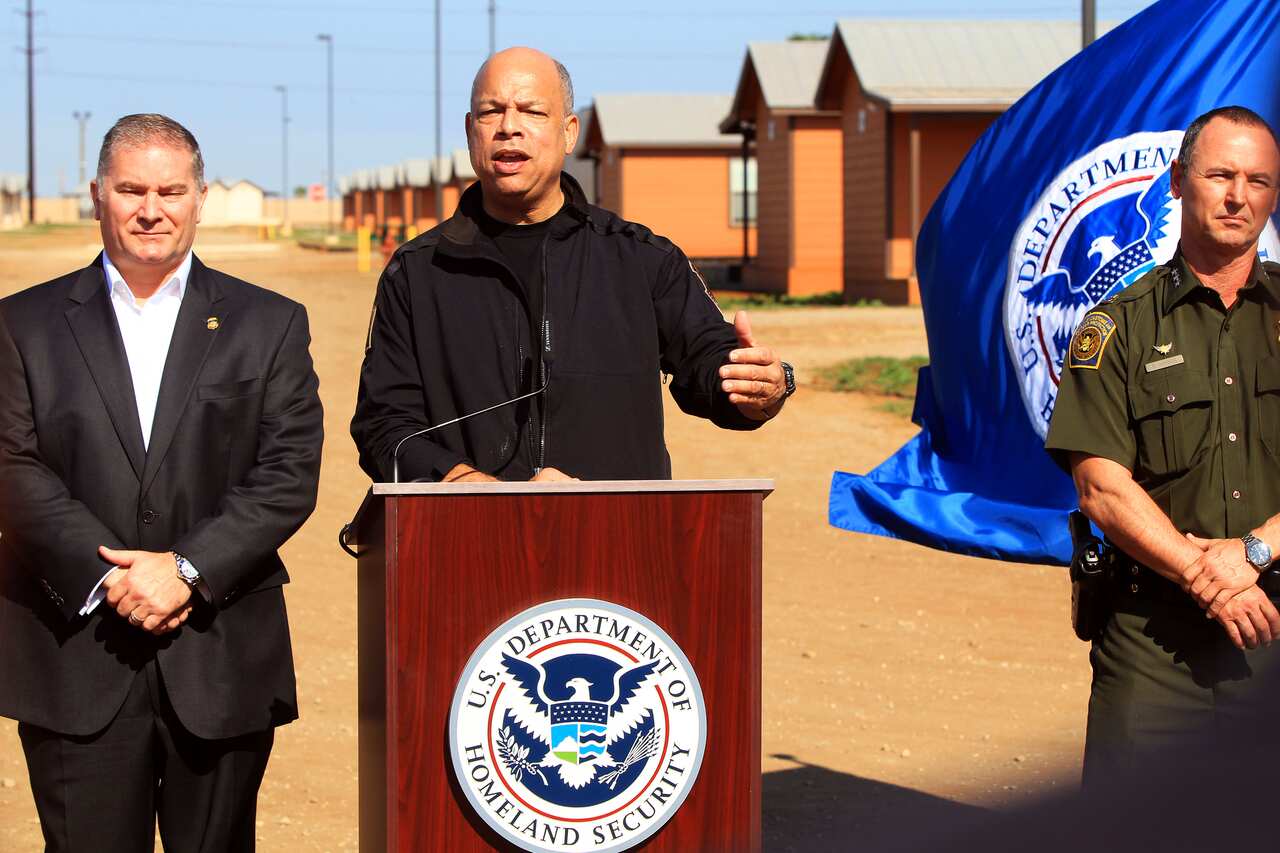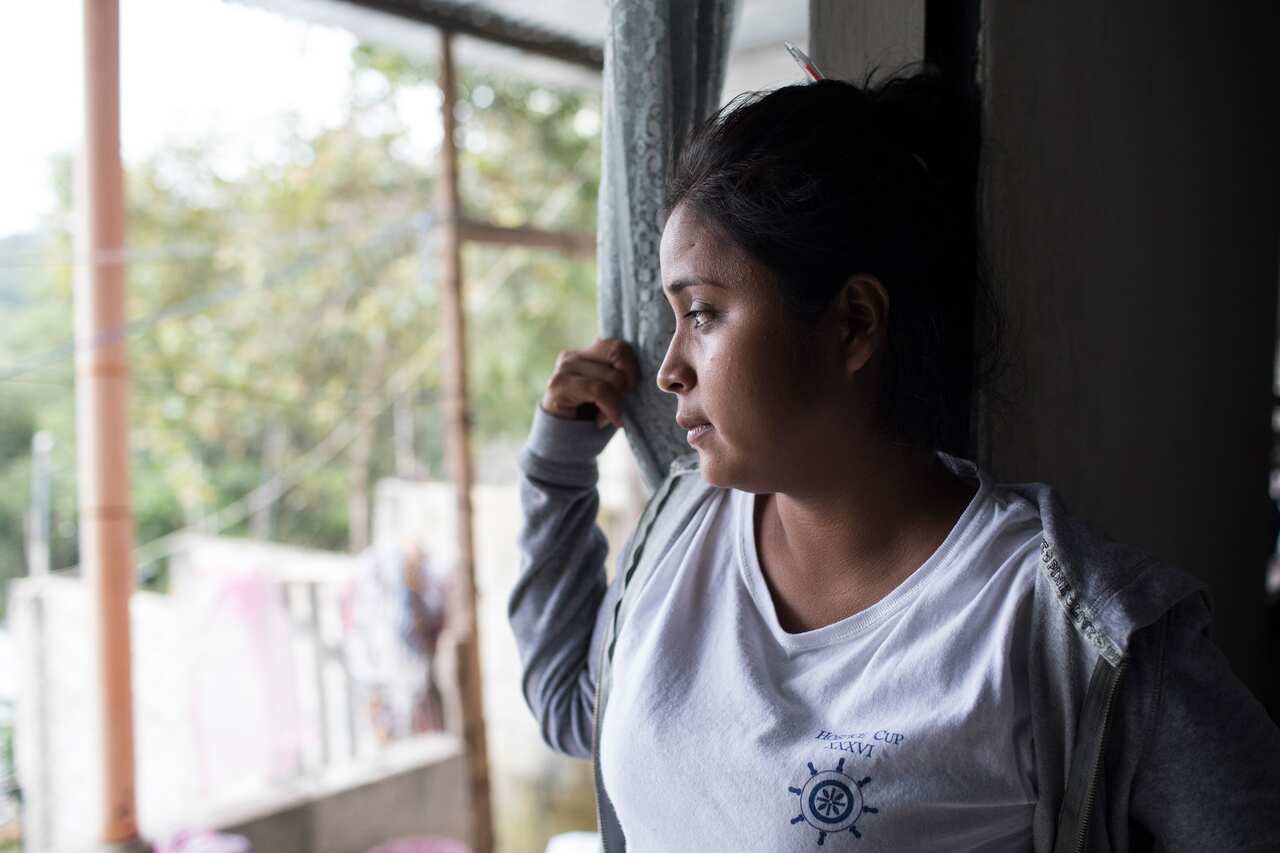They’d had a plan: Elsa Johana Ortiz Enriquez packed up what little she had in Guatemala and travelled across Mexico with her eight-year-old son, Anthony.
In a group, they rafted across the Rio Grande into Texas. From there, they intended to join her boyfriend, Edgar, who’d found a construction job in the United States.
Except it all went wrong.
The Border Patrol was waiting as they made their way from the border on 26 May, and soon mother and son were in a teeming detention centre in southern Texas. The next part unfolded so swiftly that, even now, Ortiz cannot grasp it: Anthony was sent to a shelter for migrant children. And she was put on a plane back to Guatemala.
“I am completely devastated,” Ortiz, 25, said in one of a series of video interviews last week from her family home in Guatemala. Her eyes swollen from weeping and her voice subdued, she said she had no idea when or how she would see her son again.

Elsa Johana Ortiz Enriquez shows a picture of herself with her son, in San Mauricio, Guatemala, June 15, 2018. Source: The New York Times
As the US government continues to separate families as part of a stepped-up enforcement program against those who cross the border illegally, authorities say that parents are not supposed to be deported without their children. But immigration lawyers say that has happened in several cases. And the separations can be traumatic for parents who now have no clear path to recovering their children.
“From our work on the border, we have seen a significant increase in the number of moms separated from their children, and many of them have reported they didn’t even have a chance to say goodbye before the separation,” said Laura Tuell, the global pro bono counsel at Jones Day, an international law firm providing assistance to refugees in Texas, whose lawyers spoke with Ortiz.
“Some of the women we have encountered in detention at the border have reported facing pressure to deport voluntarily in order to be reunified with their children,” she said.
'Utter chaos'
Critics say that Ortiz’s saga is the latest indication that the administration’s new enforcement strategy was rolled out without adequate planning. The processing and detention of migrant families can involve three Homeland Security agencies — Customs and Border Protection, Immigration and Customs Enforcement and Citizenship and Immigration Services — as well as the departments of Justice and Health and Human Services. Poor coordination among them has made it hard to track children and parents once their paths diverge in the labyrinthine system.
“I cannot convey enough how much utter chaos there is,” said Michelle Brané, director of migrant rights and justice at the Women’s Refugee Commission, a research and advocacy organisation that monitors immigration issues. “The government does not have a proper system in place to track families and coordinate.”

Elsa Ortiz spoke to a social worker in the United States from her home in Guatemala. Source: The New York Times
In some cases, parents and children have gone weeks without being able to communicate with one another and without knowing each other’s whereabouts. From April 19 to May 31, a total of 1,995 children who arrived with 1,940 adults were separated from their parents, according to administration officials.
Attorney General Jeff Sessions announced the policy in early May to stanch the flow of migrants, mainly from Central American countries like Guatemala. It calls for prosecuting nearly all of those who are found to have entered the United States illegally. Previously, most border-crossers who were caught would have faced deportation but not criminal charges, and would not have been separated from their children.
Children whose parents have been arrested are transferred to the custody of the Health and Human Services Department, whose staff screens them, finds housing and remains responsible for them.

Homeland Security Secretary Jeh Johnson opens a detention facility for migrant families in Dilley, Texas. Source: The New York Times
From that point, migrant parents and children become separate legal cases in the maze of government bureaucracy, and keeping them linked has proved challenging. Different legal protections are afforded to juveniles and adults in the immigration system, and as a result, reuniting families can take months or longer, several legal experts said.
In federal court, parents typically plead guilty to the misdemeanour offence of illegal entry. Many are then likely to accept “expedited removal” from the country, in the hope of being reunited quickly with their children. But children cannot be subject to expedited removal; they are automatically entitled to a full hearing before an immigration judge, and their cases take longer to resolve.
“Once the parent and child are apart, they are on separate legal tracks,” said John Sandweg, who was acting director of ICE (US Immigration and Customs Enforcement) during the Obama administration.
Once the parent and child are apart, they are on separate legal tracks.
Reunification becomes particularly difficult when a parent is deported without the child and is no longer on US soil, Sandweg said; in those cases, “there is a very high risk that parents and children will be permanently separated.”
ICE officials said there are ways they can help. The agency may seek to speed up deportation proceedings for a child if a parent accepts expedited removal. When a parent is being deported and has requested that a child accompany them, the agency works with the Department of Health and Human Services to try to make that happen, the officials said. A government hotline has been set up to help parents locate their children.
Journey to freedom
Ortiz’s greatest fear is that she won’t be able to return to the United States to claim custody of her son, and that without her intervention, he won’t be returned to her.
Ortiz provided detailed accounts and documents that attest to her detention, criminal prosecution and separation from her son. The story of how the two of them came to be in the United States involves years of difficult single parenthood in Guatemala, with both economic setbacks and threats of violence from the rising lawlessness in her community.
She gave birth to Anthony David Tobar Ortiz on 8 August 2009, in a village in the north-eastern part of the country, she said, and his father abandoned them eight months later.
“I did whatever job I could to raise him," said Ortiz, who worked at a bakery and lived with her mother.
I did whatever job I could to raise him.
A few years ago, Ortiz fell in love with a “good man,” she said, who treated her son as his own child. The man, named Edgar, moved to the United States to work in construction and had been sending money to help support them. He asked that his last name not be disclosed because he fears repercussions from federal authorities.

Elsa Johana Ortiz Enriquez was deported to Guatemala from the United States on June 5 without her son Anthony, 8, in San Mauricio, Guatemala. Source: The New York Times
This year, Ortiz, fearful of the thugs who were increasingly preying on people in her neighbourhood, decided it would be best to take her son and join Edgar in the United States. Edgar said he paid more than $1,000 to a smuggler who took Ortiz and Anthony with a group of seven other people to the border and put them on a raft for the river crossing.
They made it to Texas safely, but shortly afterwards, as they walked along a road, they were intercepted by border agents, arrested and taken to a station.
They spent the night in a processing centre that the detainees called the ‘hielera’, Spanish for freezer. “It was packed with women and children,” Ortiz recalled. “We could hardly find a spot.”
Ortiz said she was interviewed the next day by border officials, and that is when she was told her son would be separated from her. “I started to weep and weep,” she said. “I begged, please don’t do this. Don’t take him.”
The officer asked her if she had any family in the United States, and she told him about Edgar. “He told me, your partner is not his blood relative, we can’t give the child to him,” Ortiz recalled, her voice shaking over the sound of clucking of chickens in the yard.
About an hour after the officer spoke to her at the detention centre, her son’s name was called. Mother and son stood up, and over Ortiz’s loud protests, Anthony was led away. A 12-year-old girl went with him.
'Please don't put me on the plane'
A few days later, Ortiz said, she boarded a bus filled with migrants and was taken to a federal court in South Texas, where she pleaded guilty to illegal entry. “There were so many of us, and everyone agreed with what the judge said,” she recalled of the mass hearing.
After the hearing, Ortiz was transferred to another detention centre — she said she did not know its location — where she bonded with other mothers whose children had been taken away from them. Then she was transferred again, to a facility in Laredo, where she was finally able to make telephone calls.
She contacted Edgar to tell him that their plan had gone awry, and that she and her son had been arrested and then separated.
“She was crying desperately,” Edgar recalled in a telephone interview.
Ortiz contacted a Guatemalan consular official, who was reassuring. “He told me, if they deport you, you will go with your son,” she said. “I believed him. I believed that they would give me my son.”
By this time, it had been more than a week since she had seen Anthony, and she still had no idea where he was.
At one point, an immigration officer handed her a handwritten note on a pink slip of paper with the words, “Call Shelter Son” and a telephone number. But before Ortiz could get access to a phone to make the call, she said, another officer summoned her and several other women to inform them that they were booked on a deportation flight that was leaving shortly.
What about Anthony? No one would listen, she said.
Ortiz recalled sobbing heavily as she reluctantly climbed the steps to the plane that would take her and dozens of other deported migrants back to Guatemala early in June. She said she was the last to board.
“Please don’t put me on the plane,” she remembered pleading over and over in Spanish. “I can’t go without my son.”
“I was shaking, I could barely walk,” Ortiz recalled. She said that a US immigration officer escorting her across the tarmac was also in tears. “She told me to talk to the boss when I got inside the plane,” Ortiz said.
But he did not listen.
“I cried the entire flight,” she said. “When I arrived at the airport in Guatemala, I was almost fainting. They gave me a tranquillizer.”
She phoned Edgar from Guatemala the next day. “She was devastated, destroyed,” he recalled. “Crying that the child was left behind.”
He reached out to a Jones Day attorney, who provided him with the government hotline number.
After several attempts, Edgar got a woman on the line who asked for the boy’s name and date of birth. “She told me he is fine — he has clothes, shoes and his own bed, we are taking good care of him,” Edgar recalled.
Later that day, a caseworker from the shelter called the cell phone number of the boy’s grandfather, José Ortiz, in Guatemala — the only telephone number the boy had memorized. She put Anthony on the phone, and his grandfather said he seemed cheerful.
“He shared how he was learning English, playing games and being well treated,” Ortiz said.
Finally, on Thursday, she got to speak to Anthony herself. She told him to be good. They joked about an imaginary character — “the clown” — who they always pretended slept between them in the bed they shared. But she said Anthony seemed worried — about her.
“Mammy, are they treating you well in the house where you are at?” Anthony asked.
“Yes,” she said, knowing that he would not know — not until the shelter workers told him, and she dreaded how he’d respond when they did — that the house was in Guatemala.
Share


